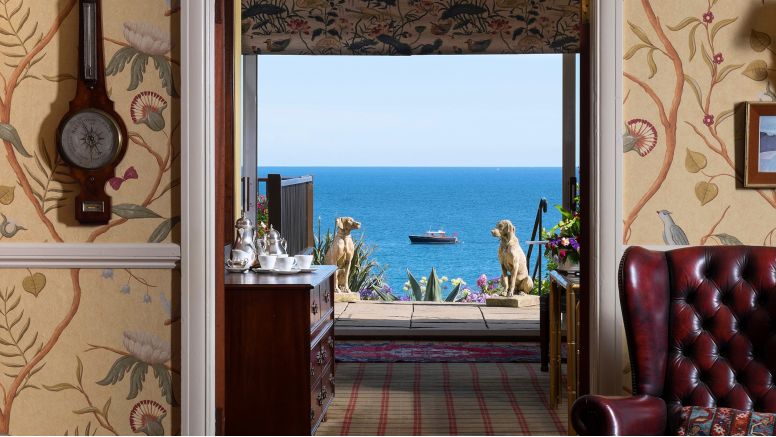The Sunday Telegraph
Welcome to The Nare – an Enid Blyton world of family fun and adventure on the Cornish coast...

Do you own more than three pairs of raspberry-coloured trousers? Do you prefer the company of Labradors to that of a significant proportion of the human population? Do you recall rationing? If you answered “Yes” to all the above, good on you. The world needs cheerful legs right now and labradors have very soulful eyes.
If not, however, you are unlikely to be familiar with The Nare Hotel in Cornwall. This is a shame, because while the Nare has long been held in high regard by a discerning class of… well, “distinguished” travellers, it really has all the makings of a fairytale hotel for young families.
It sits atop a green cliff on the Roseland Peninsula, a part of Cornwall whose balmy microclimate means palm trees and subtropical plants flourish. Steps lead from its gardens to Carne Bay, with rock pools to paddle in and clamber over.
There is a tennis court, a heated outdoor pool and a small indoor pool ideal for little legs. Wonderfully old-fashioned and smiling doormen will equip you with rackets and balls. Children are welcomed with their own bucket, spade and net, plus a book carefully chosen by the owner’s wife. Cream teas are laid on every afternoon. There really is no end of ripping fun.
To mark 30 years under its current family owners, the hotel is offering a four-night Ultimate Nare Family Break including room, breakfasts, suppers, cream teas and a daily activity, which might be a family art lesson, a day on its 38ft motor launch, spa treatments for everyone or an espionage mission based on a novel set in the hotel.
Oh, and the Nare’s chauffeur picks you up and returns you to anywhere in mainland Britain. I doubt they foresaw pulling up outside a scruffy east London primary school. As the first family to test the package, it seemed permissible to give them a challenge.
And they rose to it. The journey to Cornwall is far less arduous when someone else drives and you are handed a glass of scotch on arrival and whisked to a room with sea views and a trolley laden with cold cuts, prawns and fresh strawberries.
When the Nare says “sea view”, it doesn’t mean “stand on tiptoes and peer past this multistorey” sea view. It means “bask on the panoramic, uninterrupted, meditative blue” sea view. You can’t put a price on vistas like this – except, of course, they have.
The ultimate family package starts at £4,195 for four. Gulp. But in the Airbnb era, hotels must be more than a comfortable base in a desirable location. They must be a destination in themselves. As soon as you pull up outside the Nare, beside its vintage Morgan sports car (hireable for the day), you are transported inside an Agatha Christie novel. Rooms are characterised by wallpaper, dark furniture and pelmets. Roberts radios are tuned to Classic FM; sherry decanters are always full. Televisions are hidden behind paintings of boats.
Our bathroom is all Penhaligon’s products and panelling. Wonderfully, it also features a retractable washing line over the bath.
Staff also keep discreet notes on guests’ tastes. At breakfast, my husband mentions a preference for strong coffee. The next morning, our cafetiere arrives half-filled with grounds. Afterwards, the children race between pools and beach, then back again to the wooden hot tub with its views over the sea. The other guests, however, appear to be on a strange silent retreat for the geriatric gentry.
I hush the kids frantically, until a lady (probably, in fact, a Lady) tells me briskly to “let them be children, for goodness’ sake”. Afterwards, several guests stop to smile and chat.
We relax into lunch at the informal quarterdeck – kitted out like a yacht, with sea views and superior fish and chips. The waiter slides a brown envelope on to our table. It contains typewritten instructions from MI5. The next couple of hours pass in an excited dash down to the beach to find a code concealed among the rocks, then back to our room to key a number into the phone and hear a recorded message. Finally, we have a real-life encounter with a Russian mole disguised as waiter.
It is charming and unique – as is the family art lesson with Jeannie, the hotel’s resident artist, who taught us to look at the sea in a whole new way.
The only slight kerfuffle is at supper. Tom and I are booked into the silver-service dining room, where, it transpires, men are expected to wear a jacket and tie. The latter is found for Tom from the hotel’s collection and – as the sun sets over the sea, beyond the dessert and cheese trolleys – we feel we have travelled not only to a haven, but back in time. It is so very comfortable, and strangely comforting.